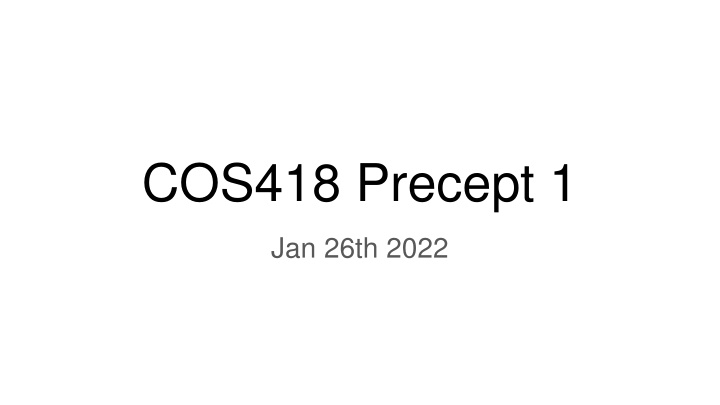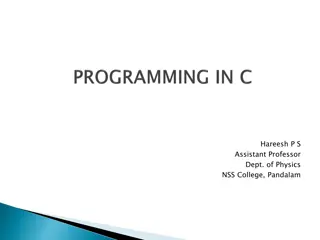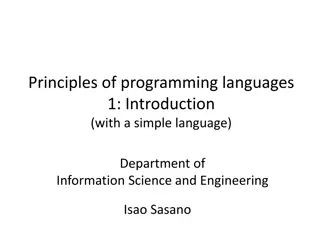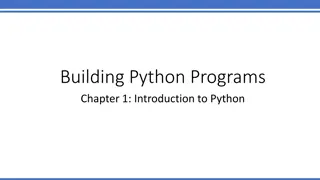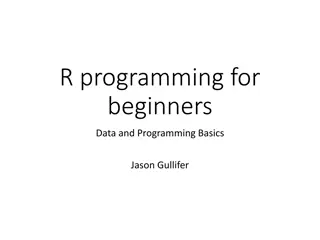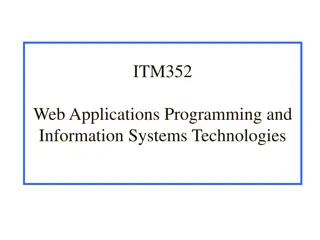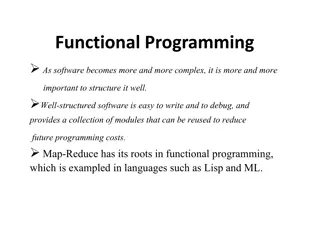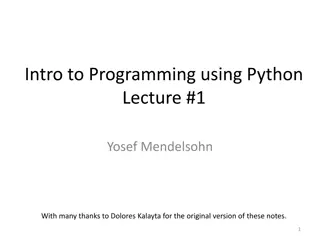Introduction to Go Programming Basics
Explore the fundamentals of Go programming language including program structure, variables, functions, loops, composite data types, and object-oriented programming concepts. Learn about package declarations, imports, variable declaration, function declaration, and more through practical examples and explanations.
Download Presentation

Please find below an Image/Link to download the presentation.
The content on the website is provided AS IS for your information and personal use only. It may not be sold, licensed, or shared on other websites without obtaining consent from the author.If you encounter any issues during the download, it is possible that the publisher has removed the file from their server.
You are allowed to download the files provided on this website for personal or commercial use, subject to the condition that they are used lawfully. All files are the property of their respective owners.
The content on the website is provided AS IS for your information and personal use only. It may not be sold, licensed, or shared on other websites without obtaining consent from the author.
E N D
Presentation Transcript
COS418 Precept 1 Jan 26th 2022
Go Resources Go tutorial: https://tour.golang.org/list Go Playground: https://play.golang.org Basic syntax code in playground: https://tinyurl.com/y7rdgqj3
Agenda for Today Go Basics Program Structure Variables Functions Loops Composite Data Types OOP in Go Exercise Time
// All files start with a package declaration package main Program Structure A basic Go program contains Package specification: serves as a separate namespace, like modules or libraries in other languages Import other packages Package-level declarations: var, func, const, type // Import statements, one package on each line import ( "errors" "fmt" ) // Main method will be called when the Go executable is run func main() { fmt.Println("Hello world!") basic() add(1, 2) divide(3, 4) loops() slices() maps() sharks() }
// Declare a package-level variable var msg string = Hello World Variables // Function declaration func basic() { // Declare x as a variable, initialized to 0 var x int // Declare y as a variable, initialized to 2 var y int = 2 // Declare z as a variable, initialized to 4 // This syntax can only be used in a function z := 4 Variable Declaration The General form var name type = expression = expression may be omitted. The variable will take zero value for the type, e.g 0 for numbers, false for boolean, for strings, and nil for the rest // Assign values to variables x = 1 y = 2 z = x + 2 * y + 3 Short Variable Declaration name := expression Only for local variables within a function // Print the variables; just use %v for most types fmt.Printf("x = %v, y = %v, z = %v\n", x, y, z) // Print the package-level string variable fmt.Println(msg) Note: Keep in mind := is a declaration, whereas = is an assignment }
// Function declaration; takes in 2 ints and outputs an int func add(x, y int) int { return x + y } Functions Function Declaration The General Form: func name (parameter-list) (result-list) { body } Named functions are declared only at the package level. // Function that returns two things; error is nil if successful func divide(x, y int) (float64, error) { if y == 0 { return 0.0, errors.New("Divide by zero") } // Cast x and y to float64 before dividing return float64(x) / float64(y), nil }
// squares() returns an anonymous function // that itself returns the next square number each time it is called func squares() func() int { var x int return func() int { x++ return x*x } } Functions Anonymous Functions Define such a function at its point of use Declare without a name following the func keyword func main() { // Assign a function variable to func squares() f := squares() fmt.Println(f()) // 1 fmt.Println(f()) // 4 fmt.Println(f()) // 9 }
Loops func loops() { // For loop for i := 0; i < 10; i++ { fmt.Print(".") } // While loop sum := 1 for sum < 1000 { sum *= 2 } fmt.Printf("The sum is %v\n", sum) } In Go, while loops are represented via for loops
Composite Data Types func slices() { slice := []int{1, 2, 3, 4, 5, 6, 7, 8} fmt.Println(slice) fmt.Println(slice[2:5]) // 3, 4, 5 fmt.Println(slice[5:]) // 6, 7, 8 fmt.Println(slice[:3]) // 1, 2, 3 slice2 := make([]string, 3) slice2[0] = "tic" slice2[1] = "tac" slice2[2] = "toe" fmt.Println(slice2) slice2 = append(slice2, "tom") slice2 = append(slice2, "radar") fmt.Println(slice2) for index, value := range slice2 { fmt.Printf("%v: %v\n", index, value) } fmt.Printf("Slice length = %v\n", len(slice2)) } Composite types are based on basic data types (e.g integers, floating point numbers, strings, and booleans). In Go, some common composite types are: Array: fixed-length, elements of same type Slice: variable-length, elements of same type Map: hash table of key value pairs Struct: contain arbitrary fields and types
Composite Data Types: Map func maps() { // Declare a map whose keys have type string, and values have type int myMap := make(map[string]int) myMap["yellow"] = 1 myMap["magic"] = 2 myMap["amsterdam"] = 3 fmt.Println(myMap) myMap["magic"] = 100 delete(myMap, "amsterdam") fmt.Println(myMap) fmt.Printf("Map size = %v\n", len(myMap)) }
Object-Oriented Programming (OOP) in Go import math // Declare a struct named Point with x, y positions type Point struct { X, Y float64} Go also provides programmers with an OOP paradigm. We can view: Object: a value or variable that has methods Method: a function associated with a particular type // Implement a method that find Hypotenuse distance between one Point and another func (p Point) Distance(q Point) float64 { return math.Hypot(q.X - p.X, q.Y - p.Y) } Methods in Go Method Declaration Similar to function declaration, but add an extra parameter between func and name. This will attach the function to the type of the parameter. Example // standard function func Distance(p Point, q Point) float64 { return math.Hypot(q.X - p.X, q.Y - p.Y) } func main() { p := Point{1, 2} q := Point{4, 6} fmt.Println(p.Distance(q)) // 5 method call fmt.Println(Distance(p, q)) // 5 function call }
Output: Bruce says CHOMP! Lee says your majesty Sharkira says yo what's up Lee Sharks and Their Methods // Object oriented programming // Convention: capitalize first letter of public fields type Shark struct { Name string Age int } // Receiver methods can take in other objects as well func (s *Shark) Greet(s2 *Shark) { if (s.Age < s2.Age) { fmt.Printf("%v says your majesty\n", s.Name) } else { fmt.Printf("%v says yo what's up %v\n", s.Name, s2.Name) } } // Declare a public method // This is called a receiver method func (s *Shark) Bite() { fmt.Printf("%v says CHOMP!\n", s.Name) } func sharks() { shark1 := Shark{"Bruce", 32} shark2 := Shark{"Sharkira", 40} shark1.Bite() shark1.ChangeName("Lee") shark1.Greet(&shark2) // pass in pointer shark2.Greet(&shark1) } // Because functions in Go are pass by value // (as opposed to pass by reference), receiver // methods generally take in pointers to the // object instead of the object itself. func (s *Shark) ChangeName(newName string) { s.Name = newName }
Go Routines Possible Output: // Launch n goroutines, each printing a number // Note how the numbers are not printed in order func goroutines() { for i := 0; i < 10; i++ { // Print the number asynchronously go fmt.Printf("Printing %v in a goroutine\n", i) } // At this point the numbers may not have been printed yet fmt.Println("Launched the goroutines") } Printing 4 in a goroutine Printing 8 in a goroutine Printing 9 in a goroutine Printing 0 in a goroutine Printing 1 in a goroutine Printing 6 in a goroutine Printing 2 in a goroutine Printing 3 in a goroutine Launched the goroutines
(Unbuffered) Channels Output: // Channels are a way to pass messages across goroutines func channels() { ch := make(chan int) // Launch a goroutine using an anonymous function go func() { i := 1 for { // This line blocks until someone // consumes from the channel ch <- i * i i++ } }() // Extract first 10 squared numbers from the channel for i := 0; i < 10; i++ { // This line blocks until someone sends into the channel fmt.Printf("The next squared number is %v\n", <-ch) } } The next squared number is 1 The next squared number is 4 The next squared number is 9 The next squared number is 16 The next squared number is 25 The next squared number is 36 The next squared number is 49 The next squared number is 64 The next squared number is 81 The next squared number is 100
Buffered Channels Output: // Buffered channels are like channels except: // 1. Sending only blocks when the channel is full // 2. Receiving only blocks when the channel is empty func bufferedChannels() { ch := make(chan int, 3) ch <- 1 ch <- 2 ch <- 3 // Buffer is now full; sending any new messages will block // Instead let's just consume from the channel for i := 0; i < 3; i++ { fmt.Printf("Consuming %v from channel\n", <-ch) } // Buffer is now empty; consuming from channel will block } Consuming 1 from channel Consuming 2 from channel Consuming 3 from channel
